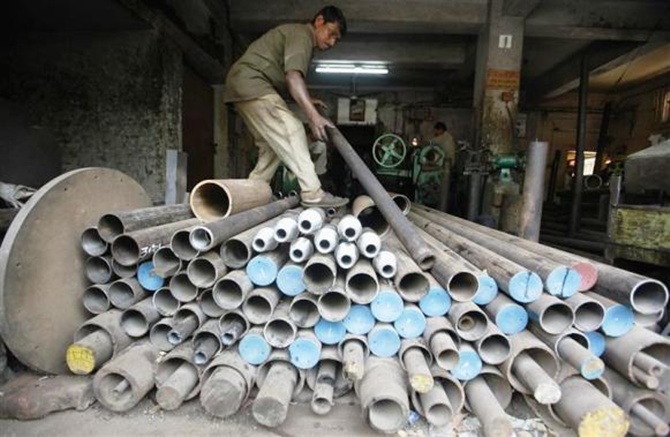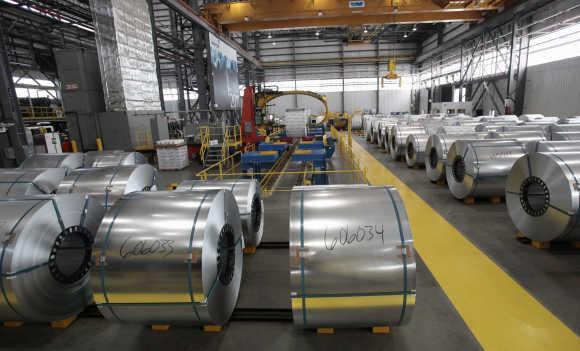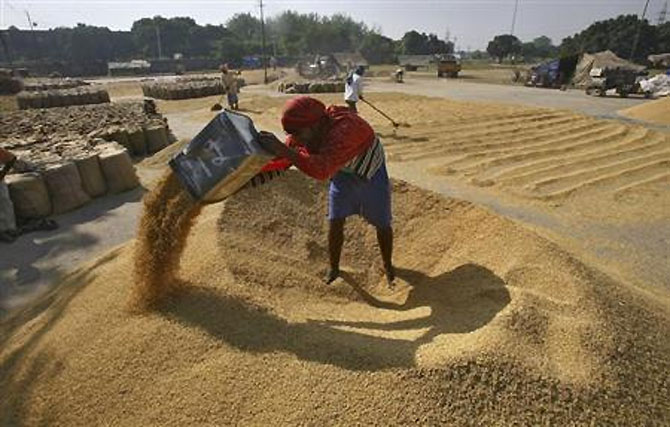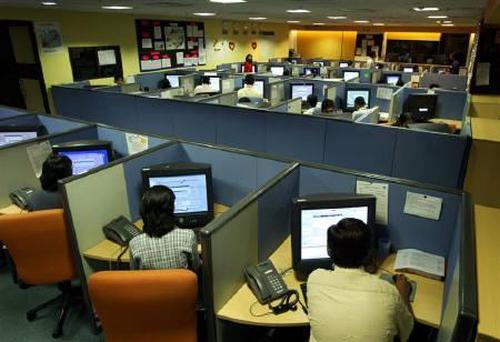Photographs: Reuters Shobha Warrier
To ensure India’s growth, we need a new revolution which should be driven by innovation, not only in technology but at organisation level also, says K J Joseph, while talking about what the next government should do to revive the Indian economy.
In an interview with Shobha Warrier of Rediff.com, Joseph, a well known economist and professor of the Ministry of Commerce Chair at the Centre for Development Studies (CDS) in Thiruvananthapuram said the country’s manufacturing sector, and export need a major push from the next government.
An advocate of innovation, he is the Editor-in-Chief of Innovation and Development, an international journal published by Taylor and Francis.
He was a Ford Foundation fellow at the Yale University, USA, a visiting senior fellow at Research and Information System for Developing Countries (under the Ministry of External Affairs) and a professor at Jawaharlal Nehru University.
Continuing our series on the state of the Indian economy as we await formation of the new government.
Part I: From boom to doom: An uphill task to revive the economy
Part II: It will take three years for economic growth to pick up
Part III: 'US economy needs to improve for India to turn around'
Part IV: Reviving the economy: What the next government should do
Part V: 'Policy paralysis in India will continue'
Part VI: 4 ways the new PM can revive the economy
Part VII: 'India's economy can never improve if agriculture is neglected'
The Indian economy is growing at just 4.5 per cent and many economists say that even with a stable government at the Centre, it may take another 2-3 years for the country to turn around. Do you agree?
 I cannot agree with this more as the Indian economy is on a downslide now. From 2005-07, the Indian economy was about to reach two-digit growth rate.
I cannot agree with this more as the Indian economy is on a downslide now. From 2005-07, the Indian economy was about to reach two-digit growth rate.
Expectations were that we were going to match China in terms of growth. In 2010-11, we had a growth rate of almost per cent but in 2011-12, it fell by 6.7 per cent and in 2012-13, it slipped to 4.5 per cent.
It is estimated to grow at a paltry 4.8 per cent in 2013-14. This is much lower compared to what we had recorded and what India has to achieve if the aspirations of people have to be met.
Regardless of which government gets elected, the challenge is to raise the rate of growth.
...
'Job creation will be first big challenge for the next govt'
Image: Industrial growth in India has been poor overall.Photographs: Reuters
Industrial growth has been poor overall. What’s your take on the issue?
Though the deceleration has been almost broad based, the industrial sector showed almost negligible growth rate at about one per cent, manufacturing industry saw de-growth and agriculture has been stagnating for quite some years.
Manufacturing is very important for any economy. Look at China, 50 per cent of its economy is driven by manufacturing industry.
In India, even in 1950-51, the share of manufacturing was just 9 per cent which went up to 15 per cent in 1980 and it did not increase even after 1991 when the government moved away from the wheel. In fact, it declined after 1991.
Is China responsible for India’s negative growth in manufacturing sector?
China cannot be blamed for downfall in our manufacturing industry. It has a strong presence in the sector and currently makes up for 21 per cent of the world’s global manufacturing output.
...
'Job creation will be first big challenge for the next govt'
Image: Manufacturing sector has seen de-growth in recent times.Photographs: Rebecca Cook/Reuters
Then what is ailing manufacturing industry in India?
I would say there are two reasons for the downfall in the sector. India being a diversified economy, there is a strong co relation between industrial and agricultural growth.
While industrial sector grew in double digits between 2005-07, agriculture grew only five per cent. However, when the industry stagnated, growth in agriculture also slowed down simultaneously.
In a nutshell, you have to revive your agricultural sector which will in turn pave way for growth in industrial units.
Having said this, if you look at history, no economy has grown on domestic demand alone. For instance, take China, South Korea or any other south east Asian country, they all are dependent on the world market. So you have to develop an export market alongside.
In the 1980s, South Korea’s population was slightly more than Kerala and it produced more colour TV sets than India.
Though people call it export led growth rate, it is actually growth- led export! If you have a domestic market, that gives you economies of scale, it will enable you to get into the world market
Many talk about India being a huge market. You are saying, if India has to grow, it cannot depend solely on this huge domestic market.
Precisely. The real world is neither white not black. While harnessing your domestic market, you can never forego the world market. That's where all the opportunities are. No economy has grown relying only on the domestic market.
Why is it that India is not able to conquer the world market? Is the world market not interested in Indian products?
We had double digit growth rate in exports when we had high growth rate in 2005-07. Export growth rate at that time was 28 per cent, 23 per cent and 22 per cent. That means high GDP growth rate was accompanied by high export growth rate.
Because of global recession, export began falling from 2008. Export growth rate declined from 30 per cent in 2004-05 to 17 per cent in 2008. It was negative 1.3 per cent last year and now it is only 5 per cent.
It is cleat that export has a very important role in driving the economy even though the domestic market cannot be ignored.
Do you think; global recession or mismanagement of the economy by the UPA too is responsible for sluggish phase in our economy?
I would say, both the factors are equally responsible for the debacle in our economy. The government was pumping money into the economy to counter global crisis.
But it should have done that in a more intelligent manner. People may be getting money due to MNERGA but they are not producing anything correspondingly.
...
'Job creation will be first big challenge for the next govt'
Image: The new government should focus on growth in agriculture sector.Photographs: Reuters
How much do you blame the decision makers?
I don't want to call it mismanagement; I think it is the inability to see economy as an interrelated system.
When the rural development ministry is pumping money into the few hands, the agricultural ministry should try to meet the demands. There is no co-ordination.
Which sector needs the next government's immediate attention?
First, agriculture and then infrastructure. To revive agriculture, you have to empower farmers. Modernisation is the most important aspect. We need a new revolution which has to be innovative not only in technology but organisationally too.
When you talk about industrial growth, the share of value addition from manufacturing has been steadily coming down.
More significantly, the share of wages also has been coming down from 1991. That affects the purchasing power of the people.
Our economic growth was never broad based. We have not been able to harness technology for the overall development of industry.
For example, India produces $100 billion worth of software. Out of this, almost $70 billion is exported. China has a total software production of $300 billion and it doesn't have the image of a software super power.
They export only 10 per cent of what they produce. That means $270 billion worth of software is domestically consumed by the industrial, services and agricultural sectors.
So much so that they are able to produce efficiently and flood the world market.
Software has to be consumed domestically as an enabling technology for other sectors to perform better.
What India does is, it produces technology and enables its competitors to be more competitive in the world market. This is an important issue it should be aware of. This is an area we should be focusing more.
We have human capital but unemployment is the major worry now. Almost all the political parties are promising jobs to lure young voters. When you have 50 per cent of your population in the employable age, how grave is the problem of unemployment?
Yes, the number of educated unemployed has increased and it is due to the way in which we have expanded education.
The fact is, they are educated but unemployable. It only exposes the pathetic state of our education. Another problem is, good people are not available for teaching, training and research.
The government's job is only to create a conducive environment and not create jobs.
...
'Job creation will be first big challenge for the next govt'
Image: New government will have to create jobs for the youth.Photographs: Shervin Castro/Reuters
How important is it to have a stable government at the centre for the revival of Indian economy?
A stable government is important. It can be very dangerous and disastrous to have a hung parliament. The left and the right wings coming together will help the economy.
As the aspirations of Indians have gone up so much that can you call the 2014 Lok Sabha elections the first economic election of the country?
Yes, I will have to agree with you. Aspirations of the masses have gone up, but who is going to fulfill them? UPA too is in so much trouble because of rampant corruption.
Modi, especially is saying he can meet people's aspirations. And, that may help him come to power. Unless you have a stable government, it is going to disastrous for India.
When NDA under Vajpayee was in power, there was high growth rate, low inflation and no major problems. People may still remember those days.
If NDA comes to power this time, it will be because people think it can do a better job of the economy. In a way, this election will be people's judgment on who can drive the economy well.






article